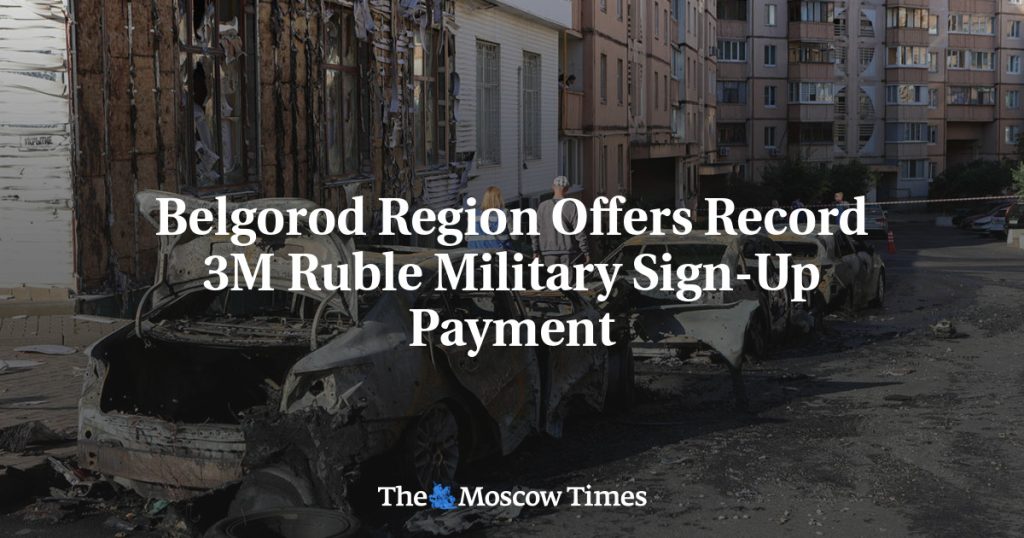Southwestern Russia’s Belgorod region is offering a nationwide record of 3 million rubles ($31,200) in one-time payments for signing military contracts to fight in Ukraine. Governor Vyacheslav Gladkov announced the payment, which will be sourced from federal, regional, municipal budgets, and extra-budgetary funds. The offer is open to volunteers or those who sign contracts with the Russian Armed Forces between Oct. 7 and the end of the year. This move comes as Russia aims to increase recruitment numbers without declaring another unpopular mobilization drive. The Belgorod region’s offer surpasses the Khanty-Mansi autonomous district, which provides a combined payment of 2.75 million rubles ($28,600) to new soldiers.
The record-setting payouts offered by the Belgorod region will be granted to anyone from any Russian region who enlists physically in that specific region, regardless of their birthplace. This initiative reflects the ongoing manpower crisis faced by Russia, as civilians’ interest in going to war continues to decline. The increasing payments for soldiers indicate the country’s struggle to attract individuals to join the military. The use of financial incentives to recruit soldiers highlights the challenges facing Russia in maintaining a strong military force amid changing societal attitudes towards military service.
The financial incentives provided by the Belgorod region signify a growing trend in Russia where more money is being offered to individuals who volunteer or sign contracts with the military. As recruitment numbers dwindle and interest in enlisting decreases, authorities are turning to monetary rewards to attract new soldiers. The perceived crisis in manpower is prompting regions like Belgorod to offer substantial sums to entice individuals to join the military. This shift in recruitment strategies suggests that traditional methods of conscription may no longer be effective in meeting the country’s military needs.
The announcement of the 3 million ruble payment for military recruits in the Belgorod region has raised concerns about the motives behind such lucrative offers. Critics question the ethical implications of providing large sums of money to individuals to fight in conflicts, such as the ongoing conflict in Ukraine. The use of financial incentives to boost recruitment numbers may be seen as a way to circumvent the reluctance of the population to participate in military engagements. It also raises questions about the impact of monetary rewards on the motivations and commitment of soldiers who are attracted by the promise of financial gain.
As Russia’s military recruitment efforts evolve to include substantial financial rewards, there is a growing need to examine the long-term implications of such strategies. While financial incentives may help attract new soldiers in the short term, they may not address the underlying issues affecting recruitment and retention in the military. The reliance on monetary rewards to boost recruitment numbers highlights the challenges faced by the Russian military in adapting to changing societal norms and attitudes towards military service. It also underscores the need for a comprehensive approach to recruitment that goes beyond offering financial incentives to address the complex factors influencing individuals’ decisions to join the military.
In conclusion, the decision of the Belgorod region to offer a record payment of 3 million rubles to military recruits reflects the broader challenges facing Russia in maintaining a strong military force. The use of financial incentives to attract new soldiers highlights the evolving nature of military recruitment strategies in response to changing societal attitudes towards military service. While the short-term impact of such incentives may boost recruitment numbers, there is a need to consider the long-term implications of relying on monetary rewards to address the country’s manpower crisis. As Russia continues to grapple with recruitment challenges, a comprehensive approach that considers a range of factors influencing individuals’ decisions to join the military will be essential to ensure the country’s defense capabilities in the future.


